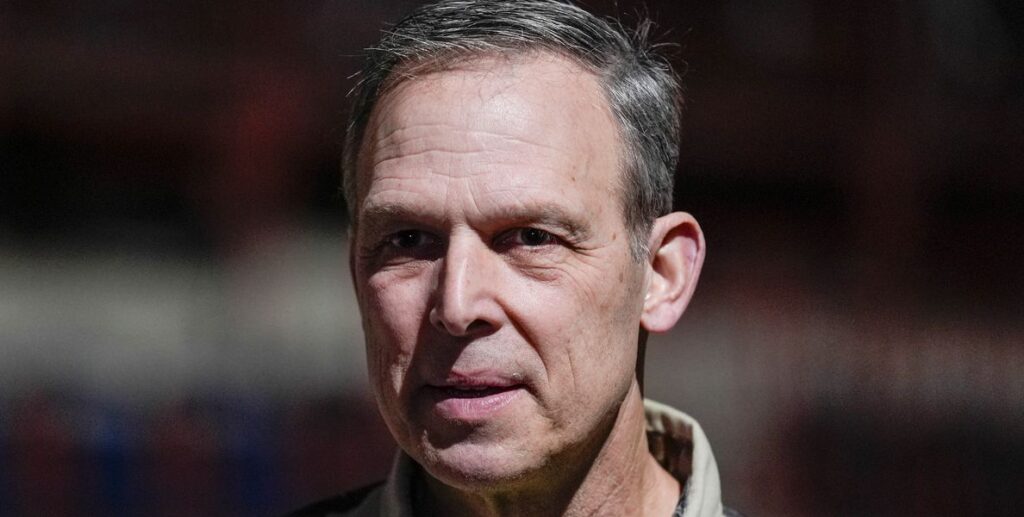As the upcoming November elections approach, Republicans are increasingly attempting to distance themselves from “Project 2025,” a 900-page policy framework created by the Heritage Foundation aimed at substantially reconfiguring the U.S. government should Donald Trump return to the presidency. The project has drawn sharp criticism from Democrats and constitutional law experts who argue that it prioritizes an ultra-conservative agenda and could further centralize power in the presidency — tendencies seen as authoritarian. Among the Republicans grappling with the implications of Project 2025 is Rep. Scott Perry (R-Pa.), who, facing a tight reelection campaign, has shifted his public stance on the initiative. Initially vocal in his support, Perry now seems to be downplaying his familiarity with the project as he prepares for his sole debate against Democratic challenger Janelle Stelson.
During a July 13 interview, Perry expressed his approval of Project 2025 and its goal of preparing for a potential second Trump presidency by positioning conservative allies within the federal government. He asserted that the intention behind the project was not inherently malicious, portraying it as a proactive strategy for the right. According to Perry, Democrats’ alarm regarding Project 2025 stemmed more from fear of accountability than any genuine risk to democracy. Perry underscored the notion that a second Trump administration could benefit from how Project 2025 planned to immediately implement its agenda through supportive civil servants. His characterization of the initiative emphasized that the plan would facilitate a swift start for a future Trump presidency, suggesting he saw no substantial danger in its proposals.
However, in an unexpected pivot roughly a month later, Perry’s narrative surrounding Project 2025 took a somber turn. At a tele-town hall on August 21, he claimed to know very little about the specifics of the document, even admitting his lack of knowledge about its length and content. Despite having previously expounded on its aims and benefits, Perry distanced himself from the project, expressing uncertainty about his potential support for certain aspects. He characterized the project as something he had hardly reviewed, which raises questions about his shift in attitude toward the initiative. This change in tone could create awkward scenarios for Perry in his tightly contested race, particularly as he debates his opponent.
The inconsistencies in Perry’s narrative about Project 2025 have led to speculation about political motivations and the possible electoral implications of embracing the initiative fully. Given the close polling in his district—rated “lean Republican” by the Cook Political Report—Perry’s strategy raises eyebrows, particularly considering his previous vocal endorsements of Trump and right-wing agendas. Throughout his campaign, Perry has navigated the tensions between his alignment with far-right policies and the more centrist electorate in his district. The fallout from the revelations surrounding Project 2025 may influence his path to reelection as constituents evaluate the implications of supporting or rejecting the agenda outlined in the policy.
As Perry protected his political skin, questions arose concerning the broader implications of Project 2025 for the Republican Party. The pushback against the initiative from various factions within the GOP suggests a growing concern about how association with extremist policies might alienate voters ahead of the elections. This complexity calls into question whether Project 2025 might become a contentious issue within Republican ranks, creating a schism between traditional conservatives and those embracing more extreme agendas. The fear of losing voters to perceived authoritarianism might compel other Republicans to rethink their public positions and create a ripple effect of distancing from overtly radical measures being proposed.
Perry’s own controversial history, having been involved in election denialism and scrutiny over the January 6 Capitol incident, compounds the implications of his shifting stance on Project 2025. These factors intertwine, painting a portrait of a congressman reassessing his political liabilities as he faces a potentially career-defining election. With public opinion hanging in the balance, Perry’s eventual responses and strategies about Project 2025 will be crucial in shaping not only his own future but also the party’s broader strategy heading into and beyond the November elections. The results could define the Republican Party’s identity and alignment with extremist ideology, as they grapple with the consequences of both their past actions and the proposals like those encapsulated in Project 2025.

